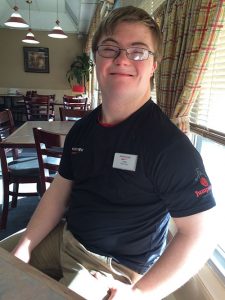By Vince Terstappen, Project Assistant with the health promotions team at Northern Health

When you walk into Sport Chek in Smithers and see Jesse Clegg unpacking garments and hanging gear, you may not realize the significance of that moment. You may not realize the number of people, programs, time, and advocacy that created that moment.
You may not realize the number of people, programs, time, and advocacy that created that moment. You may not realize that moment wouldn’t have been possible just ten years ago, or that it shines a light on some ongoing challenges facing families. You may not realize that what you’re seeing is a powerful example of a healthy family supported by a healthy community.
And this is exactly why Jesse’s story is so important to share.
“When you have a child with a disability,” said Anita Clegg, Jesse’s mother, “there are no days off.” Jesse, now 21 years old, was born and raised in Smithers. Jesse has Down syndrome and, throughout his life, the Clegg family was committed to breaking ground in the community. “We put ourselves and Jesse out there,” shared Anita, “because it was important for us to show that everyone has abilities. As people learn more and connect with Jesse, we’ve seen shifts in thinking.”
When Anita says that “the village helped to raise our child,” this is not a cliché. While Jesse’s parents continue to assume a strong advocacy role, the impact of community members, organizations, and businesses on Jesse’s life is profound.
Consider the local bowling alley …
“Anything round that moved, Jesse was on it!” said Anita. “So bowling was a good fit. Jesse couldn’t start with Special Olympics until he was a teenager so, when he was 10, we asked about joining the town league. The bowling alley was very supportive and Jesse joined a team with typical kids. One year, he was the high scorer for the teen youth league! Jesse still loves to bowl and the bowling alley is a safe, welcoming, and familiar place for him.”
… and the pediatrician …
“Our pediatrician truly went to bat for Jesse. He understood Jesse’s needs, made connections that others wouldn’t have made, and helped to advocate for Jesse from others wouldn’t have made, and helped to advocate for Jesse from birth right until he turned 18.”
… and the family friend …
“Safe and reliable respite is so important for families,” shared Anita. “We were very fortunate to have a family friend offer to take Jesse one day each week, starting in his last year of high school. They started out by just playing cards with me around but now they spend the afternoon together. Jesse has dinner with her family.”
… and the local business owner …
“Jesse is now in the workforce,” said Anita, “and that involved a lot of people coming together. It was a lengthy process but well worth it! When we told Jesse that the employment plan was going to be possible, his exact words were: ‘Everything is perfect!’ This process started with Jesse’s microboard (nine family members and community members) working with Jesse to create a picture of his skills, interests, and strengths. Jesse shared that he’d love to work at Sport Chek – which came out of the blue to us since he’d never been there! Our local WorkBC office asked the manager if they’d be interested in a supportive employment opportunity. The manager instantly said yes and went even further, integrating Jesse as a full team member, without a support person. His colleagues trained him and have been fantastic – many of them knew Jesse from school.”
These supportive community experiences, however, also point to some of the challenges that Jesse’s story illuminates:
Access to health and social services is an important determinant of health. Unfortunately, Jesse’s pediatrician – whose role cannot be understated – recently retired. Anita identified this, along with some other changes to local social service delivery, as a challenge.
Respite for families is crucial. The Cleggs benefited from the generosity and support of their friend. Unfortunately, Anita shares that funding for organized respite and semi-independent housing for young adults with disabilities is being spread thinner and thinner.
Jesse’s new work life is a fine example of how integration has made a huge difference for him. This hasn’t always been the case. As Jesse made his way through the school system, the Cleggs experienced both integration and segregation, often changing based on policy and funding. They chose to homeschool Jesse for a period of time when the school system was unable to meet his needs.
What does this boil down to for Anita Clegg?
“Smithers is a wonderful place and an amazingly generous community. My son knows way more people than I do,” she laughed, “and people watch out for him. There are just a few missing pieces, especially for some of the day-to-day, nitty-gritty challenges of raising a child with a disability.”
Concepts like healthy and inclusive communities can be hard to define, but in Jesse’s case, they are clear and their impact is profound. It’s the friend offering respite, the welcoming bowling team, and the local business eager to offer him work.





